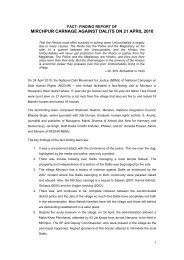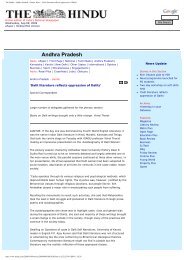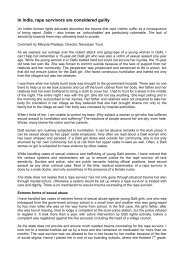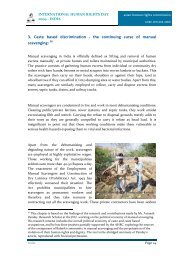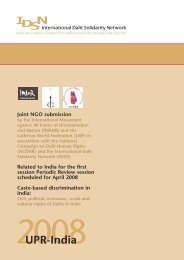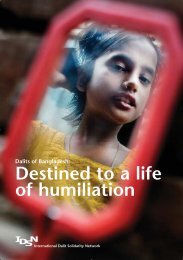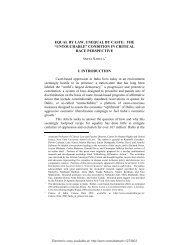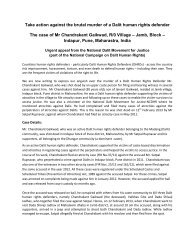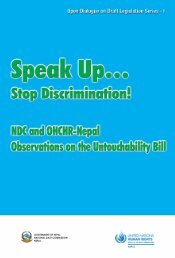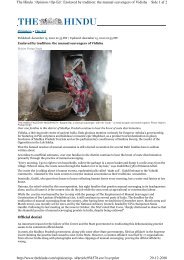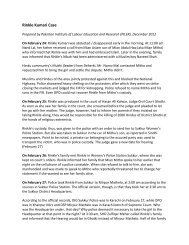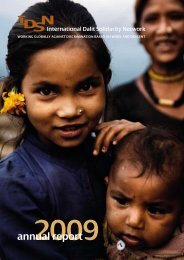A Global Alliance Against Forced Labour - International Labour ...
A Global Alliance Against Forced Labour - International Labour ...
A Global Alliance Against Forced Labour - International Labour ...
Create successful ePaper yourself
Turn your PDF publications into a flip-book with our unique Google optimized e-Paper software.
GLOBAL ACTION TO COMBAT FORCED LABOUR341. Priority has been given to creating awarenessamong the social partners on the need for concerted actionagainst trafficking and forced labour. In January2003, SAP-FL and the ILO Bureau for Workers’Activities (ACTRAV) held an informal consultationin Geneva for representatives of workers’ organizationsand key resource persons on the issues of forcedlabour, irregular migration and human trafficking inEurope. 20 An Asian regional meeting in Kathmandu,Nepal, in March 2003, organized jointly by IPEC,SAP-FL and ACTRAV, brought together workers’representatives from across the region to discuss bothchild labour and forced labour. 21342. The new project on combating human traffickingand forced labour outcomes, covering theRussian Federation, Tajikistan and Uzbekistan, seeksthe more active engagement of trade unions in thisissue. An October 2004 meeting for trade union representativesin Moscow focused on ways in whichunions can improve conditions of Tajik and other irregularmigrant workers in the Russian Federation.An information campaign is now being plannedthrough trade unions in several parts of the country.Advising on law and policy frameworks343. ILO attention has been directed principally toensuring that national anti-trafficking laws, policiesand programmes give due attention to the labour dimensionsof trafficking. Detailed guidelines on traffickingand forced labour exploitation, intended inparticular for legislators and law enforcement agents,have been prepared. 22 The guidelines review newtreaty obligations as regards trafficking, as well as theILO’s own pertinent instruments. They discuss therole of civil, administrative and labour law, and providepractical guidance for identifying and protectingthe victims of forced labour, and for prosecuting recruitersand other trafficking auxiliaries. They alsoexamine the roles of different labour, law enforcementand other institutions in combating trafficking.These guidelines are already being put to practicaluse: for example, a Russian translation was presentedat an inter-ministerial workshop in December 2004in Moscow, to feed into the drafting of a new antitraffickingBill. An inter-ministerial workshop inGermany in November 2004 discussed the guidelines,as well as the findings of research in Germany,drawing attention to the forced labour experienced byirregular migrants in different economic sectors.344. Together with other specialized agencies, theILO has assisted governments and the social partnersin drafting or broadening the scope of NationalAction Plans against Human Trafficking in countriesincluding Albania, the Republic of Moldova,Romania and Ukraine. Under the auspices of ILOMIGRANT’s project in Albania, the Republic ofMoldova and Ukraine, assistance is being given onformulating a policy on “safe migration”, and in ensuringthat national employment plans benefit actualand potential trafficking victims. IPEC has supportedthe development of a large number of National Plansof Action against the Worst Forms of Child <strong>Labour</strong>,including specific National Action Plans againstChild Trafficking.345. In Nigeria, the newly established NationalAgency for Prohibition of Trafficking in Persons andOther Related Matters (NAPTIP) is now developinga National Plan of Action to combat trafficking,with ILO technical assistance. In September 2004,the ILO organized a national stakeholder workshopwith representatives of government agencies, workers,employers and NGOs from different parts of thecountry. Recommendations for the Plan of Actionincluded amendments to legislation, as well as channellingpoverty alleviation programmes to groupsvulnerable to trafficking and the establishment of anational monitoring system.346. Several countries have drawn on the provisionsof the Private Employment Agencies Convention,1997 (No. 181), to introduce a licensing system forprivate employment or recruitment agencies and tomonitor their activities. In Nigeria, for example,where the <strong>Labour</strong> Code is currently being revisedwith ILO assistance, a proposed system of licensingand monitoring of private recruitment agencies seeksto prevent their collusion with human trafficking networks.Elsewhere, labour inspectors are being givenspecial powers to inspect sites where forced labour issuspected, and to impose sanctions. For example, thenew draft <strong>Labour</strong> Code of Ukraine stipulates thatlabour inspectors have the right to visit any buildingsand premises where inspectors have reasonablegrounds to believe that forced labour is used.347. The ILO also tackles trafficking by encouragingmore open migration policies, arguing thatproperly managed migration can both empower migrantworkers and enrich their countries of origin.An objective of projects in Albania, the Republic ofMoldova and Ukraine, and in the Greater MekongSubregion, is to improve migration law and policy byintroducing monitoring of private recruitment agenciesand negotiating bilateral agreements on labourexchange. Given the magnitude of trafficking fromAlbania towards Greece and Italy, the ILO has promotedbilateral agreements to prevent child traffickingand to repatriate victims, and provided technical assistancefor the negotiation of these agreements. IPEC20. Consultation on the <strong>Forced</strong> <strong>Labour</strong> Outcomes of Irregular Migration and Human Trafficking in Europe, Geneva, 8-9 Jan. 2003. ILO:<strong>Forced</strong> labour, migration and traffi cking in Europe, Special Action Programme to Combat <strong>Forced</strong> <strong>Labour</strong> (unpublished document, 2003).21. Workers’ Consultation on the Role of Trades Unions in Fighting Child <strong>Labour</strong> and <strong>Forced</strong> <strong>Labour</strong>, Kathmandu, 3-6 Mar. 2003.22. ILO: Human traffi cking and forced labour exploitation: Guidance for legislation and law enforcement, Special Action Programme to Combat<strong>Forced</strong> <strong>Labour</strong> (Geneva, 2004).75



